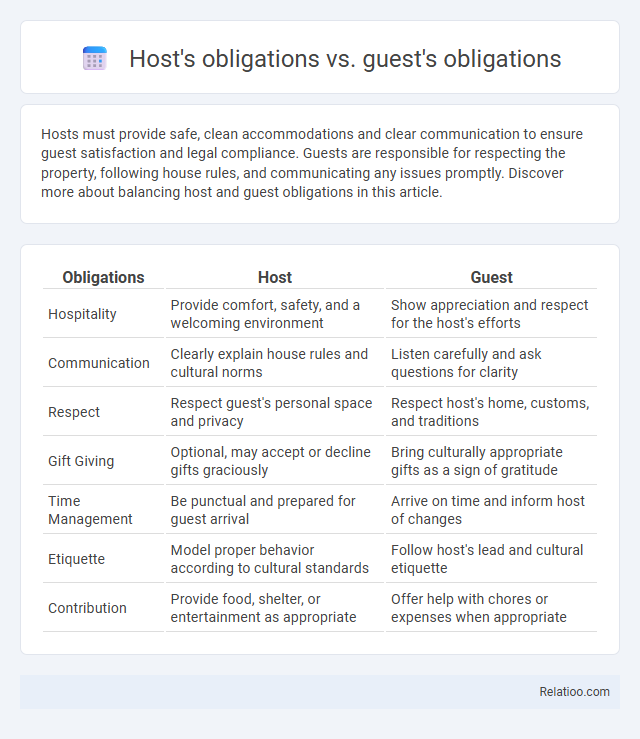Hosts must provide safe, clean accommodations and clear communication to ensure guest satisfaction and legal compliance. Guests are responsible for respecting the property, following house rules, and communicating any issues promptly. Discover more about balancing host and guest obligations in this article.
Table of Comparison
| Obligations | Host | Guest |
|---|---|---|
| Hospitality | Provide comfort, safety, and a welcoming environment | Show appreciation and respect for the host's efforts |
| Communication | Clearly explain house rules and cultural norms | Listen carefully and ask questions for clarity |
| Respect | Respect guest's personal space and privacy | Respect host's home, customs, and traditions |
| Gift Giving | Optional, may accept or decline gifts graciously | Bring culturally appropriate gifts as a sign of gratitude |
| Time Management | Be punctual and prepared for guest arrival | Arrive on time and inform host of changes |
| Etiquette | Model proper behavior according to cultural standards | Follow host's lead and cultural etiquette |
| Contribution | Provide food, shelter, or entertainment as appropriate | Offer help with chores or expenses when appropriate |
Defining Host Obligations
Host obligations primarily involve ensuring the safety, comfort, and legal compliance of the premises provided to guests, including maintaining hygiene standards, securing the environment, and fulfilling contractual agreements. Guest obligations encompass respecting house rules, timely payments, and behaving responsibly to avoid damage or disturbances. Hospitality obligations extend beyond the transactional duties to include delivering a welcoming atmosphere, personalized service, and fostering positive guest experiences.
Understanding Guest Obligations
Guest obligations primarily involve respecting the host's property, adhering to agreed-upon house rules, and maintaining cleanliness throughout the stay. Understanding your guest obligations ensures a harmonious experience by promoting trust and preventing conflicts during your visit. These responsibilities differ from host obligations, which include providing a safe, comfortable environment and transparent communication, while hospitality obligations encompass the broader cultural and ethical norms guiding both parties.
Legal Responsibilities of Hosts
Hosts bear significant legal responsibilities to ensure the safety and well-being of guests, including maintaining premises free from hazards and complying with health and safety regulations. Guests are obligated to respect the property, follow house rules, and avoid causing damage, while hospitality obligations center on providing fair treatment and fulfilling contractual terms. Failure to uphold host obligations can result in liability for injuries or breaches of contract under premises liability and hospitality law.
Legal Responsibilities of Guests
Guests have specific legal responsibilities including adhering to property rules, respecting the host's belongings, and avoiding illegal activities on the premises. Hosts are responsible for providing a safe environment and ensuring compliance with local regulations, while hospitality obligations emphasize mutual respect and fair treatment. Legal consequences arise if guests violate these terms, encompassing potential eviction, liability for damages, and legal claims for breach of contract.
Ethical Expectations for Hosts
Host obligations ethically require respecting guests' dignity, privacy, and safety, ensuring a welcoming and non-discriminatory environment. Guest obligations focus on honoring house rules and showing gratitude, while hospitality obligations encompass broader cultural norms promoting mutual respect and kindness. Your role as a host demands balancing these ethical standards to foster trust and meaningful connections.
Ethical Expectations for Guests
Ethical expectations for guests revolve around respecting host obligations such as maintaining property cleanliness, following house rules, and being considerate of shared spaces to ensure mutual comfort. Your responsibility includes clear communication and honoring agreed-upon schedules to foster trust and goodwill. Hospitality obligations emphasize a reciprocal understanding where guests uphold integrity and respect to preserve the positive experience envisioned by the host.
Common Challenges in Fulfilling Obligations
Host obligations often include providing a safe environment and clear communication, while guest obligations typically involve respecting property and adhering to house rules. Hospitality obligations require balancing comfort with professionalism, which can create challenges such as managing guest expectations and handling unforeseen issues. Your success depends on navigating these overlapping responsibilities effectively to maintain trust and satisfaction.
Consequences of Neglecting Obligations
Neglecting host obligations can result in legal liabilities, property damage, or loss of trust, while ignoring guest obligations may lead to conflicts, damage claims, or exclusion from future visits. Hospitality obligations encompass both parties' responsibilities, and failing to uphold them can cause reputational harm and deteriorate relationships. Ensuring Your adherence to these duties minimizes risks and fosters a safe, respectful environment for all involved.
Best Practices for Hosts and Guests
Hosts must ensure a safe, clean, and welcoming environment, provide clear communication, and respect guests' privacy to meet hospitality obligations effectively. Guests should respect house rules, communicate any issues promptly, and leave the space tidy to foster a positive experience. Your cooperation in following these best practices strengthens mutual respect and enhances the overall quality of hospitality interactions.
Balancing Rights and Responsibilities
Balancing rights and responsibilities in hospitality requires clear understanding of host obligations such as providing a safe, clean environment and respecting guest privacy, alongside guest obligations including adherence to property rules and respectful behavior. Hospitality obligation encompasses this mutual respect and cooperation to ensure a positive experience for both parties, emphasizing accountability and open communication. Your rights as a guest are protected when hosts fulfill their duties, while your responsibilities contribute to maintaining a harmonious and respectful stay.

Infographic: Host obligations vs Guest obligations
 relatioo.com
relatioo.com